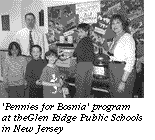
Volume 4, Number 2 -- December, 1997

Volume 4, Number 2 -- December, 1997
by Glenn Ruga
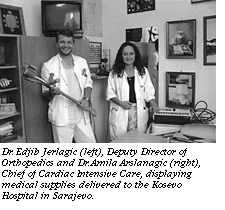 After
nine months of planning, outreach, collecting, sorting and packing, FOB finally
sealed a 40-ft. container on June 17 bound for Bosnia. In addition to $350,000
of medical supplies, we collected a pallet of photographic equipment for a youth
center in Mostar, (see article on p. 3.) four boxes of athletic shirts donated
by Reebok to a children's foundation in Sarajevo, seven boxes of toys for an orphanage
in Zenica, and 10 boxes of toiletries donated by Avon. Four weeks later the container
was due to arrive in Rijeka, Croatia.
After
nine months of planning, outreach, collecting, sorting and packing, FOB finally
sealed a 40-ft. container on June 17 bound for Bosnia. In addition to $350,000
of medical supplies, we collected a pallet of photographic equipment for a youth
center in Mostar, (see article on p. 3.) four boxes of athletic shirts donated
by Reebok to a children's foundation in Sarajevo, seven boxes of toys for an orphanage
in Zenica, and 10 boxes of toiletries donated by Avon. Four weeks later the container
was due to arrive in Rijeka, Croatia.
Frank Ward and I traveled to Rijeka to meet the container and were confronted with the first of many delays. We were told that the boat was late, that we didn't have the proper papers, and that a Croatian national holiday would force all trucks off the road. A few hours of frantic phone calls to Bosnia and Scotland worked out the scheduling problems and the shipping broker suggested I return after the weekend to take possession of the container.
Frank and I made use of the weekend to drive to Mostar where Frank was to spend the next two weeks teaching photography. I returned to Rijeka on Monday to meet a 40-ft. truck and driver provided us by our friends at Edinburgh Direct Aid. While I expected the worst--the driver getting lost and the container being further delayed--I arrived at the terminal at 6:00 a.m. to see an EDA truck first in line at the gate. Knocking on the truck window, I wakened a weathered Scottsman, Sandy Taylor, and he crawled out of a sleeping bag, rubbing his eyes and said, "Aye mate, let's get some coffee." Thus began a week-long friendship as we drove an overweight truck down impossible roads along the Dalmatian coast, across the deserted Krajina and into a customs compound in Bihac on the Bosnian/ Croatian border.
Not quite sure if it was due to corruption, unnecessary bureaucracy, or complete incompetence, Sandy and I spent the next 24 hours and $250 to get through customs. Every transport vehicle coming into Bosnia--whether bringing Coca Cola, building supplies, or humanitarian aid--was subject to similar treatment.
Once we entered Bosnia, Sandy and I headed for Kljuc, a two-hour drive south through rolling farmland. The scenery reminded me of my home in Massachusetts, except for an occasional horse-drawn cart, frequent SFOR convoys, and the all too often sight of destroyed homes.
Edinburgh Direct Aid has their Bosnian headquarters in Kljuc.The region was ethnically cleansed at the beginning of the war and became part of Serb-controlled Bosnia, but unlike eastern Bosnia, the region was retaken during the end of the war and is now back in Federation control.
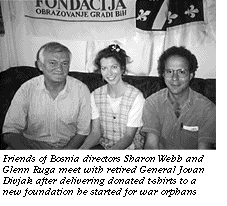 Similar to eastern Bosnia, many
Muslims were killed or driven out in 1992. The town now has a new cemetery marking
200 victims of a massacre. Many of the mosques were destroyed. Upon returning
to the town in 1996, the previous residents found everything of value taken from
their homes by fleeing Serbs--not only furniture and valuables, but carpets, wiring
and electrical fixtures, plumbing, windows, doors and railings.
Similar to eastern Bosnia, many
Muslims were killed or driven out in 1992. The town now has a new cemetery marking
200 victims of a massacre. Many of the mosques were destroyed. Upon returning
to the town in 1996, the previous residents found everything of value taken from
their homes by fleeing Serbs--not only furniture and valuables, but carpets, wiring
and electrical fixtures, plumbing, windows, doors and railings.
Sandy and I spent two nights in Kljuc as guests of a family that EDA helped to resettle. We stayed up late into the evening, alternating between home-made slivovitz and Turkish coffee, while Ramos and Raifa told us their story of separation, exodus, prison, re-unification and return. Ramos recounted horrific details of being arrested by Serb nationalists --some whom were former neighbors -- and being beaten endlessly. He ended up in the Manjacka concentration camp were he personally witnessed many prisoners being beaten to death. He was lucky to be released after seven months and reunited with his family in Edinburgh, Scotland. Raifa, his wife, told us of hiding in fear, dressing her son like a girl to avoid arrest, and her final explusion. It was a story of epic proportions and repeated a million times throughout Bosnia--often with far more tragic results.
The hospital in Kljuc suffered as well. The few doctors who returned found an empty building. Pleading with us that that they receive very little from aid organizations, we agreed to give them about twenty percent of the medical supplies we were carrying. We gave the hospital three EKG machines, an EEG, a fax machine, surgical lights, and cases of general surgical supplies. Early the next morning Sandy and I set out for Sarajevo.
The route from Bihac to Sarajevo is a checkerboard of ethnic enclaves. First you pass through Mrkonic Grad, or "the anvil," a region that juts into Federation territory and was given to the Serbs at Dayton because someone at the last minute thought they needed more territory to complete their 49%. There were no check points in or out of Republika Srpska. The only telling signs were the Serb nationalist symbols painted on homes and bridges and desperate young women waving cartons of cigarettes at passing vehicles. The economy of Srpska is in shambles due to their non-compliance with Dayton and the fact that their government is run by corrupt war criminals (a.k.a. Radovan Karadzic) who profit greatly from control of cigarettes and gasoline sales.
After Mrkonic Grad, we passed through regions alternately controlled by Herzeg Bosna and the Federation. Whereas Mrkonic Grad is part of the legal entity of Republika Srpska, Herzeg Bosna is an illegal Croatian nationalist entity that was supposed to be disbanded by Dayton. Instead it continues to use Croatian currency, the Croatian flag, Croatian license plates, and a phone system tied to Croatia. Enroute to Zenica we stopped in the Herzeg Bosna-controlled town of Jajce, and later learned that returning Muslim refugees were assaulted that day and newly laid landmines were found surrounding their homes.
After stopping briefly in Zenica to deliver some toys to an orphanage, we finally arrived in Sarajevo by mid-afternoon. Dr. Arslanagic was rushing out the door to attend to Alija Izetbegovic, the Bosnian president. (She is the president's personal cardiologist.) That day Izetbegovic was meeting with Richard Holbrooke and the other members of the Bosnian presidency--Momcilo Krajisnik and Kresimir Zubak. Sandy, a crew from the hospital, and I spent the rest of the afternoon unloading supplies into the cardiology clinic. Some were then distributed to other clinics in the hospital.
Workmen are everywhere at the Kosevo Hospital were putting in new water mains and electrical conduit, and repairing walls and windows. Some parts of the cardiology clinic have been rebuilt with the latest equipment, whereas other parts still have gaping holes in the walls. The biggest problem now is the perception by much of the world that the war is over and aid agencies are pulling out. Prior to the war, all healthcare was paid for by the government; now, no one pays for it. The government pays only a token amount to the clinics, and adult patients are required to pay only a fraction of what the care is worth. As evidenced in much of Eastern Europe, the transition to a market economy can be almost as disruptive as war.
After saying our good-byes
to the hospital staff, Sandy and I drove three hours further south to Mostar to
drop off the photo supplies to Mladi Most, completing the delivery of aid we had
brought from the U.S.
by Sharon Webb
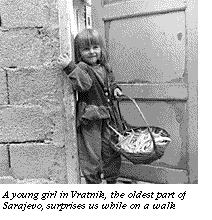
What impressed me the most about my 1997 trip to Bosnia, was the Bosnian people themselves and their generous, open-hearted spirit. When I arrived in Sarajevo in August, I was warmly welcomed into the Dizdarevic household--mother and sister of Amherst resident, Kira Hasanovic--and from then on felt like one of the family. This gracious treatment was repeated throughout my trip and by the end I felt like I was adopted by many families. The relatives of my Bosnian friends in Amherst were especially happy to see me and hear news about their daughters, sons, and grandchildren now living with refugee status in the U.S. These families have not seen each other in many years, and the pain of separation was obvious. I began to see how much my contact and support meant to these people who are bound by the unfortunate fate of their country, and it became the most meaningful part of my month-long trip.
This openness was also apparent with complete strangers. While visiting Mostar, I stayed with a Croatian woman who lived near our friends at Mladi Most. Without a common language between us, we communicated with key words and a lot of patience. I heard about her family and how three grenades fell on her house during the fighting. All was repaired now except her terrible memories. When it was time to say goodbye, she hugged me close and said she felt as if I was her sister.
Another time I was with my host, Mediha, when she decided we should "hitchhike" home from a rather inaccessible park near Sarajevo. She waved her hands in front of the first car that appeared on the road and the young driver agreed to give us a ride. Soon he and my friend were chatting amiably in the front seat. He had served in the army and when he learned I had driven over Mt. Igman during my first trip to Bosnia two years ago, he offered to take us up the mountain road for old times sake. Next, he took us to the Hrasnica entrance of the underground tunnel that had served as a lifeline for the people of Sarajevo during the war. Mediha recounted how she and her cousin had walked the mile-long, five-foot-high tunnel once to buy food in Hrasnica. We ended up spending the rest of the afternoon with our driver--going out for dinner, meeting up with a girlfriend of his and returning to her mother's house for coffee. It was amazing how an everyday encounter with a stranger could be so delightful. One would think, after enduring years of relentless attack before an uncaring world, Bosnians would be guarded and suspicious of foreigners--to say the least. But that is not in character with Bosnian culture. Communing with friends and family plays a prominent role in everyone's daily life, and I am convinced it has helped sustain these people during their time of tragedy.
I spent one day working on the "frontlines" of the reconstruction effort with Zainab Salbi, Director of Women for Women (WFW). Through a micro-credit lending program, she and two Bosnian program officers are leading the effort to provide women with opportunities for economic self-sufficiency. I accompanied them to the village of Vogosca for a meeting of local women who had qualified to receive the loans. During the process, the participants must submit business proposals, and undergo training on budgeting and managing their projects. These skills play a valuable part in helping women undertake new leadership roles to rebuild their communities, and provide for their families.
In spite of the new direction WFW is taking, it is still maintaining its original sponsorship program to take care of those who have no other options. There is currently an urgent need for more sponsors to help reduce the waiting list of hundreds of old, infirm and desperately poor women. There is a false impression that because fighting has stopped, there is no longer a need to send direct financial aid to the people. Nothing could be further from the truth. The Bosnian economy is not ready to provide for its people; they depend on our help. Please consider the rewarding experience of being a WFW sponsor for a year or six months.
Another highlight of my trip was being on hand for the debut screening in Bosnia of "Calling the Ghosts" at the Sarajevo Film Festival. It was great to see filmmaker friends Karmen Jelencic and Mandy Jacobsen, and film subjects Nusreta Sivac and Jadranka Cigeli receive an extended standing ovation for their courage and hard work. The screening was also made special by the attendance of 13 women from Vogosca who had survived Srebrenica. Afterward, these women, with devastating stories of loss and torture of their own, sat down to talk with Nusreta and Jadranka. I imagine it was very moving for them to meet two women who made the decision to reveal their torture in order to publically, and legally, condemn those responsible. I think it also reinforced to Nusreta and Jadranka the importance of their work, at a time when it must pain them to see those who committed these abhorrent atrocities remain free and unaccountable.
Someone else was taking notice of this important
encounter--the women's discussion was filmed by a camera crew from Washington
DC for inclusion in a documentary on the work of Women for Women, to be aired
in February on the cable channel, Lifeline. During my stay, I saw the loving,
caring part of Bosnian life that people are trying to reassert into their daily
routines. However, the dysfunctional economy and lack of supporting infrastructures
prevents any real progress toward the security that people crave. Everyone I met
was emotionally drained from the hardships they had endured, and are still enduring.
But intellectually, most adults accept the likelihood of further violence as real.
In this climate, the aid and resources that we can offer are still as valuable
as ever, and my meetings with UN and other officials provided me with plenty of
projects for FOB to pursue. But sadly, most people admit it will take generations
to recreate the multi-ethnic, multi-religious communities that once existed in
Bosnia. They have lived through too much to put any more faith into false hopes.
by Stephen Walker
Recent weeks have seen a reemergence of the argument that the U.S. should cut its losses in Bosnia, accept the "realities" of ethnic separatism and hatred, and bring about the final and permanent partition of Bosnia and Herzegovina. While this might seem appealing to those who know little or nothing about the true realities of Bosnia, partition is not a real option for peace in Bosnia. It can only bring more conflict, more suffering, more hatred. The irony of this new debate over partition is that it comes when, for the first time since the signing of the Dayton Accords, there is new reason for hope.
During a recent visit to Bosnia with my fellow Friends of Bosnia board member, Alma Musanovic-Johnson, I was struck by the sober optimism many Bosnians in Sarajevo and Tuzla shared after the recent municipal elections. After four years of fighting and a brutal genocide that included the indiscriminate shelling of innocent civilians and the use of mass rape, the initial statistics from the elections showed that most Bosnians want to return to their homes. Perhaps as many as 89 percent of those voting voted - either in person or as absentees - in their place of original residence! In several important towns, including Srebrenica and Drvar, voters elected councils that would return political power to the ethnic or religious group that was the majority before the war. In many others, multiethnic councils were elected, offering the hope that, if implemented, these election results could point the way to reintegrating Bosnia, undermining and removing from power the ultranationalists and war criminals, and creating conditions for all Bosnians to live in peace and get about the process of rebuilding the economy and their lives.
With this new optimism, however, come raised expectations that, if not met, could undermine the fragile peace of the past two years. If the United States and the international community do not begin a serious, credible process for implementing the results of these municipal elections and returning refugees and displaced persons to their homes, Bosnians will lose faith in the Dayton Accords and peace and will seek other means for seeking justice and a way back to their homes.
It seems as though the Clinton Administration has at least realized that U.S. troops must remain in Bosnia beyond the latest troop withdrawal deadline of June, 1998. Keeping the troops in Bosnia is important. But equally as important is what those troops will do. The Administration's resistance to allowing our troops to engage in activities that would place them at risk has resulted in many lost opportunities since the troops began arriving in December, 1995. We can ill afford to miss many more.
Our troops--and our involvement as a whole--need clear objectives and goals and the mandate from the President to pursue them. These goals and objectives are already clear to those of us who have been involved in trying to save Bosnia since the early days of the war. Now it is time to make clear to the President and our elected representatives in Washington what those goals and objectives should be.
The objectives of a serious U.S. policy in Bosnia should be consistent with our interests in peace, stability, democracy, and respect for fundamental human rights in the region. Paramount should be:
Support for a united, multiethnic, democratic Bosnia and Herzegovina within its internationally recognized borders; and Return of refugees and displaced persons to their homes in a secure environment.
Specific policies can and should be advocated in support of these key objectives. Such policies should have clear, achievable goals for NATO troops and international organizations working in Bosnia, including:
1. Arrest of indicted war
criminals, especially Radovan Karadzic and Ratko Mladic. This policy should
include providing the Hague Tribunal with adequate funding and staff to handle
the increase in prosecutions.
2. Implementation of the results of the
recent municipal elections. This policy should include the use of NATO troops
and the International Police Task Force (IPTF) to create secure conditions for
councils to work and refugees/displaced persons to return home. This process should
begin with several high-profile municipalities in the Bosnian Serb Republic and
the Federation where multiethnic councils were elected or where power should shift
to the pre-war majority group (Srebrenica, Drvar, etc.).
3. Creation of
a real balance of power in the region through the U.S.-led Train and Equip
Program. Such a balance must take into account real operational capabilities and
numerical equipment holdings and must include evaluation of external and internal
threats to the Federation.
4. Revision of the NATO mandate to allow for
extended troop presence that would place less emphasis on patrolling the Zone
of Separation and a new emphasis on supporting the above tasks and a new IPTF
mandate to facilitate national government control of international borders and
customs.
We are now in the midst of a policy debate that presents us with
a new opportunity--the first since the signing of the Dayton Accords--to influence
decision makers in Washington and affect the future course of events in Bosnia.
Once again, the Clinton Administration is short on goals and ideas. We are not.
Gathering support for our ideas and objectives in Washington can help shape the
mandate of a continued U.S. military presence in Bosnia and seize the new opportunity
for bringing real peace to this beautiful country that has suffered all too long.
Stephen Walker is the Director of the Balkan Institute and a
Board member of Friends of Bosnia.
by Frank Ward
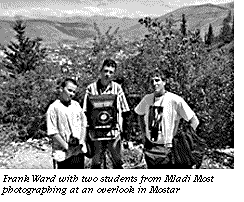
"Mladi Most" means "Youth Bridge" in Bosnian and is an organization in Mostar that attempts to bring children from the Muslim East and the Croatian West together. The name refers to the ancient 16th- century bridge, the Stari Most, destroyed in the war and is so prominent a symbol for Mostar, and indeed, for Bosnia itself. When I first heard of the need to offer a photography course at this center, I was excited about teaching photography to teenagers from both sides of this tragically divided city. I immediately started collecting photographic equipment from photographers, camera stores, and manufacturers for shipment with FOB's medical aid material in June. Our greatest find was a new Bessler enlarger donated by Ed Kostiner.
Mladi Most is located in what was "no man's land" during the war, behind a bombed out building on a residential street that serves as the dividing line between the Moslem and Croatian sides of Mostar. Most of the children on our end of the street are not allowed to cross the street a half block away. At the intersection is an SFOR tank stationed 24 hours a day.
The children and teenagers at the center are primarily of Croatian heritage although many are either Muslim or from mixed marriages. The kids do not spend a lot of time talking about each other's background or the past. The emphasis is on the present moment and the future. The children simply act their age, in spite of the sobering experiences most had during the war.
I was invited to Mladi Most as a visiting artist. I did mini-workshops in pinhole photography and in using the view camera -- an 8x10 camera that was a big hit. On many afternoons, a line of children would form to look under the black cloth of the large camera. When the queue got too long, someone would appoint himself as timer and count off ten seconds for each child to look through the camera. Then the kid would get a wack on the head as a signal to move on.
In the house, supervision is minimal. Kids come to be themselves. There are classes in English, computers, massage, cooking, drumming and photography. Instruction is most likely to take place one to one or as a small group on the floor in a room where a half dozen other things are going on. Mostarians are used to concentrating amid chaos. I was told that techno was the best music to listen to while going to sleep during the war because the incessant beat helped mask the sounds of gunfire and explosions. I saw this on my first trip to Bosnia the previous year. This time, we could hear explosions almost daily at Mladi Most as mine sweeping teams detonated their discoveries. There was never a comment about the explosions from the children.
 The only thing more popular than the upside down view through the camera was to
be photographed by it. I photographed at Mladi Most and in the streets of Mostar
constantly. On the streets the Spanish SFOR troops recognized me, cafe owners
invited me in for free coffee, and members of the American IPTF commented that
the 8x10 distinguished me from the usual photojournalists. I took great pleasure
in photographing the everyday rhythms of Mostar.
The only thing more popular than the upside down view through the camera was to
be photographed by it. I photographed at Mladi Most and in the streets of Mostar
constantly. On the streets the Spanish SFOR troops recognized me, cafe owners
invited me in for free coffee, and members of the American IPTF commented that
the 8x10 distinguished me from the usual photojournalists. I took great pleasure
in photographing the everyday rhythms of Mostar.
I learned a lot from the
young people I met in Mostar. I saw no interest in war or nationalist politics.
The teenagers want an education and a job. The youngsters just want to have a
place to belong and be happy. Mladi Most provides for some of these needs. A resolved
peace is the best way to facilitate the rest. If Bosnia can grow past this period
of imposed hatred, Bosnia's next generation will insure that the country will
endure. I am grateful that I could be part of what must be the future for Bosnia.
Frank Ward is staff photographer at Amherst College and winner
of numerous awards for his documentary photography.
Joan Cocks is Professor of Politics at Mount Holyoke College and Chair of the Program in Critical Social Thought. Her published work in political theory includes The Oppositional Imagination: Feminism, Critique, and Political Theory (Routledge, 1989) plus a variety of articles on Marxism, feminism, body politics, and, most recently, nationalism. Her experience as a member of the short-lived political group, "Arabs and Jews against the Gulf War," and later her frustration with the passivity of Western intellectuals in the face of genocide in Bosnia, led her to shift her focus of research to the troubling questions that nationalism poses for critical intellectuals and for society as a whole.
Adnan Zubcevic is from Sarajevo where he was
a neuropsychiatrist at the University Clinical Center, Kosevo Hospital. He came
to the U.S. in 1994 to flee the war and destruction of his city. He now works
with the International Institute of Boston as the regional coordinator for newly
arrived Bosnian refugees.
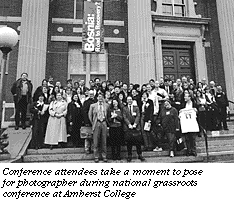 On March 2 - 3, 1997, FOB hosted a national grassroots activist conference
titled, "Bosnia: Road to Recovery?" Held at Amherst College with the
help of co-organizer Prof. Jochen Lorentzen, it was deemed a success by all involved.
We regret that this report comes to you almost a full year later, but feel the
information learned at the conference is still valuable in assessing current events.
The article is excerpted from the March 1, 1997 edition of This Week in BiH.
On March 2 - 3, 1997, FOB hosted a national grassroots activist conference
titled, "Bosnia: Road to Recovery?" Held at Amherst College with the
help of co-organizer Prof. Jochen Lorentzen, it was deemed a success by all involved.
We regret that this report comes to you almost a full year later, but feel the
information learned at the conference is still valuable in assessing current events.
The article is excerpted from the March 1, 1997 edition of This Week in BiH.
by Sharon Machlis Gartenberg
Advocates of a multi-ethnic Bosnia must again pressure Washington to fulfill the pledges it made at Dayton if another war is to be avoided when foreign troops leave the Balkans. That was the message several speakers brought to a national grassroots conference which attracted advocates from across the United States and Canada. While Bosnia supporters are happy that the large-scale killing there has stopped, many fear that policy blunders now could undo the accomplishments of the past year and spark more fighting in the future. "There's a retreat going on ... throughout Bosnia,'' said Stephen Walker, a former State Department official now at the Balkan Institute. "[NATO troops] are becoming more like UNPROFOR."
"The situation today is not to be described as peace. It is an imposed cease-fire," said keynote speaker Roy Gutman, the Newsday reporter who won a Pulitzer Prize for reporting on Serb-run concentration camps in Bosnia. Gutman's speech focused on the massacres in Srebrenica, where up to 8,000 Muslim men... were slaughtered while international officials did nothing. "Far from learning any lessons," he said, "I think we haven't even begun to ask the hard questions." The UN forces sent to Bosnia during the war were "virtual" soldiers, he said. "They are there not to do something, but to appear to do something." And their commanders' real goal was simply to protect the soldiers at all costs.
"The genocide that occurred in Srebrenica was a logical outcome of the concept under which the UN force was deployed in the first place. It became almost inevitable," according to Gutman. "There are lessons to be learned...[but] I am afraid we are repeating the history of what happened." He blamed French policies adopted by the UN -- such as "safe areas" with no real protection and the failure to use airstrikes -- for the enclaves' fall. Although Western intelligence knew for weeks that Serbs were planning attacks on the eastern enclaves, Janvier assured UN superiors the day before the attack that no action was imminent, Gutman noted.
Other conference highlights:
Journalists from
Croatia and Serbia outlined the situation within Bosnia's two powerful, nationalist
neighbors. Vjera Bogati from HINA (the Croatian National News Agency) said that
while the Croatian government mouths support for the Dayton agreements, it continues
to finance hardline Croatian extremists in Bosnia who are blocking all attempts
at a return to multi-ethnic living. "It's a double game at the moment,"
she said. She urged the U.S. government to push Croatia into real Dayton compliance.
"They can be pressured and they respond to international pressure,'' she
said. She also advised the international community to concentrate first on those
Croats who are ready to live again with Muslims in a federation. Such Croats are
more likely to be in central Bosnia than in Hercegovina. Srdja Popovic, publisher
of Vreme in Serbia who left Belgrade in 1991, described the rise of nationalism
there in the late `80s and early `90s as frightening. "Sometimes I couldn't
recognize people I met in the streets," he said. "They changed overnight."
People who were educated, cultured colleagues considered him a traitor for questioning
the nationalist line. "You're causing weakness and disunity. You're isolated."
Popovic said that Serbs have not yet faced the truth about the genocide and war
crimes their forces committed in Bosnia. In fact, no opposition leaders are confronting
the issue; nor are Serbs now out on the streets. "The protesters who did
nothing during the carnage ... feel somehow that they should be admired for protesting,"
he added. Former Congressman McCloskey, now counsel to the Bosnian federation
on Brcko arbitration, said that chief arbitrator Robert Owen had been prepared
to award Brcko to Bosnia's national government -- meaning it would belong to the
whole country, not one of its ethnic entities. However, England and Russia reportedly
balked at the decision, calling it totally unacceptable; the Washington Post
also reported that U.S. Defense Secretary Cohen was unhappy (American soldiers
patrol the Brcko region). The result: the Clinton Administration pressured Owen
into postponing his decision. This despite the fact that the Bosniak-Croat Federation
complied with all the arbitrators' requests while Serbs first sought to stonewall
proceedings, then threatened to go to war if they lost, and then admitted that
Muslims would never be permitted to live there again (the Federation pledged that
Serbs living there before the war were welcome to remain).
"Promises were made and then ignored," McCloskey said. Had the issue truly been decided on the basis of law and equity, "it's an open and shut case," he noted. Brcko had a Muslim-Croat majority before Serbs killed or expelled almost all non-Serbs in 1992. Meanwhile, the American supervisor to be appointed to oversee Brcko refugee returns during the year-long postponement "will not have any direct military authority," McCloskey noted. "Who is going to tell the illegally placed Serbs ... that it's time for them to go?" The supervisor is to be assisted by two deputies -- a Briton and a Russian, from the two countries that didn't want the city returned to multi-ethnic rule.
Brcko is strategic both for Serbs -- since it sits on a narrow corridor linking the eastern and western halves of "Srpska" -- and the Federation, because it controls the vital north-south link to the rest of central Europe. Without Brcko, Bosnia will be totally dependent on Croatian hardliners now controlling Hercegovina for land and sea trade routes. "This is not just about Brcko," McCloskey said. "This is about the future of Bosnia and the region." One positive part of the ruling: Brkco's strategic port on the Sava river is to be administered by a national corporation.
Premier copies of As Long as Sarajevo Exists, a book by Kemal Kurspahic, were unveiled. It tells the story of his newspaper's fight to continue publishing during the brutal siege of the Bosnian capital. Although their building was destroyed early (and quite deliberately) by Serb shelling and five staffers were murdered, Oslobodjenje somehow managed to publish, maintaining its multi-ethnic staff of Serbs, Croats, Muslims, and Jews in the face of extremists who sought to rip the country apart. "We have proved that a tradition, culture, and long-standing spirit of multi-ethnic cooperation can't be killed by artillery," Kurspahic told the American Journalism Review. "That's what I am most proud of."
Finally, a statement made by former Indiana Congressman Frank
McCluskey sums up the sentiments of participants in the fourth annual grassroots
gathering: "To me, [Bosnia] is the most significant issue on the planet as
we close the 20th century [and for] our hopes for peace, stability and morality
as we go into the 21st century."
In March Friends of Bosnia received a $5000 grant from the Seattle-based Kongsgaard-Goldman Foundation to help fund the national grassroots conference at Amherst College, our traveling Art & Photo Exhibits (Zones of Separation: The Struggle for a Multiethnic Bosnia), and the medical aid drive. We are most grateful the them for their generous support for Bosnia and the efforts of FOB.
We are also grateful to Paul
Olum for a very generous contribution towards creating a lasting peace in
Bosnia and the work of FOB to help achieve this goal.
Individuals
Irena Bozin-Markovic
Nancy Coan
Frances Crowe
Bob Falvey
Deb Goddard
Ed Herbert
Bill Johnston
Ed Judice
Molly Martin
Michael Metzler
John Niesyn
Ron Odde
Dr. John Pastore
Tom and Johanna Plaut
David Rohde
Stan Sherer
Chuck Stern
Dr. Hugh Tatlock
Bob and
Janet Winston
Dick Yerga
Organizations
Amherst College,
Amherst, MA
Ampro, South Hadley, MA
Com Color, Springfield, MA
Glen Ridge Primary Schools
Share New England, Canton, MA
Physicians
for Human Rights, Boston, MA
Smith College, Northampton, MA
Donations
of Medical Equipment
Bay State Medical Center, Springfield, MA
Bridgeport
Hospital, Boston, MA
St. Elizabeth's Medical Center, Boston, MA
Dr.
Jane Schaller, Boston, MA
Dr. Kendrew, Amherst, MA
Cranston Surgical
Center, Brookline, MA
Universal Medical, Norwood, MA
Boston Artificial
Limb, Burlington, MA
